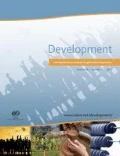Abstract

Liliana Acero is a Visiting Professor of the Post Graduate Programme on Public Policies, Strategies and Development (PPED) of the Institute of Economics at the Federal University of Rio de Janeiro (UFRJ), Brazil and a Coordinator of a CNPQ Research Project on stem cell research (www.govcel.com.br).
Similar content being viewed by others
Notes
The latter are based on assumptions about an existing ‘balance in Nature’, and tend to focus their analysis and recommendations using aggregate patterns whose variations they try to control, instead of responding and adapting to them.
Risk defined as situations in which the range of potential results and probabilities is known; incertitude, where possible results are known but there is no way to establish probabilities, and where discernment prevails; ambiguity, where there is a divergence on the nature of results or different groups prioritize incompatible perspectives; and ignorance, where nobody knows results or it is impossible to know them, so that unpredictability prevails.
References
Acero, Liliana (2011) Pesquisas Com Células Tronco e Terapias Celulares: Governança, Visões Sociais e o Debate no Brasil, Rio de Janeiro: e-Papers Ed.
Diniz, Eli (2007) ‘O pos-consenso de Washington, tendências e perspectivas: um balanço’, in Eli Diniz (ed.) Globalização, Estado e Desenvolvimento: Dilemas do Brasil no novo milenio, Rio de Janeiro: FGV Editora.
Diniz, Eli (2009) ‘Estado, variedades de capitalismo e Desenvolvimento em Países Emergentes’, paper given at a conference on ‘Promovendo Respostas a Globalização’, Rio de Janeiro, Brazil, 3–6 November.
Evans, Peter (2003) ‘Alem da “monocultura institucional”: instituições, capacidades e desenvolvimento deliberativo’, Sociologias 9: 20–63.
Evans, Peter (2009a) ‘In Search of the 21st Developmental State’, paper given at a conference on ‘Promovendo Respostas a Globalização’, Rio de Janeiro, Brazil, 3–6 November.
Evans, Peter (2009b) ‘Constructing the 21st Century Developmental State’, paper given at a conference on ‘Promovendo Respostas a Globalização’, Rio de Janeiro, Brazil, 3–6 November.
Evans, Peter (2009c) ‘From Situations of Dependency to Globalized Social Democracy’, paper given at a conference on ‘Promovendo Respostas a Globalização’, Rio de Janeiro, Brazil, 3–6 November.
Leach, Melissa, Gerry Bloom, Adrian Ely, Paul Nightingale, Ian Scoones, Esha Shah and Adrian Smith (2007a) ‘Understanding Governance: Pathways to sustainability’, STEPS Working Paper 2, Brighton: STEPS Centre.
Leach, Melissa, Ian Scoones and Andy Stirling (2007b) ‘Pathways to Sustainability: An overview of the STEPS centre approach’, STEPS Working Paper, Brighton: STEPS Centre.
O’Donnell, Guillermo (2002) ‘Las poliarquías y la (in) efectividad de la ley en América Latina’, in José Méndez and Guillermo O’Donnell (eds.) La (in)efectividad de la ley y la exclusión en América Latina, Buenos Aires/Barcelona/Mexico: Paidós.
Sen, Amartya (1999) Development as Freedom, Oxford: Oxford University Press.
Sen, Amartya (2001) ‘What Development is About?’, in Gustavo Meier and Joseph Stiglitz (eds.) Frontier Development Economics, New York: Oxford University Press.
Sen, Amartya (2009) The Idea of Justice, London: Allen Lane.
Sen, Gita (1997) ‘Globalization, Justice and Equity: A gender perspective’, Development 40 (2): 21–26.
Additional information
Calls for the transformation of social gender relations along with an end to racism, sexism and all forms of discrimination
Rights and permissions
About this article
Cite this article
Acero, L. Pathways Towards Sustainability, Participatory Human Development and the State. Development 54, 205–208 (2011). https://doi.org/10.1057/dev.2011.18
Published:
Issue Date:
DOI: https://doi.org/10.1057/dev.2011.18




